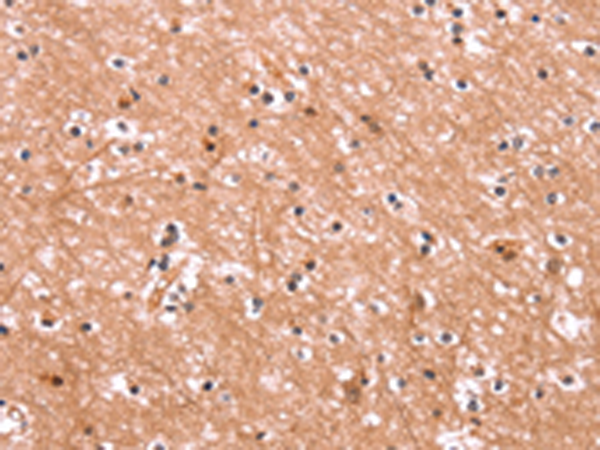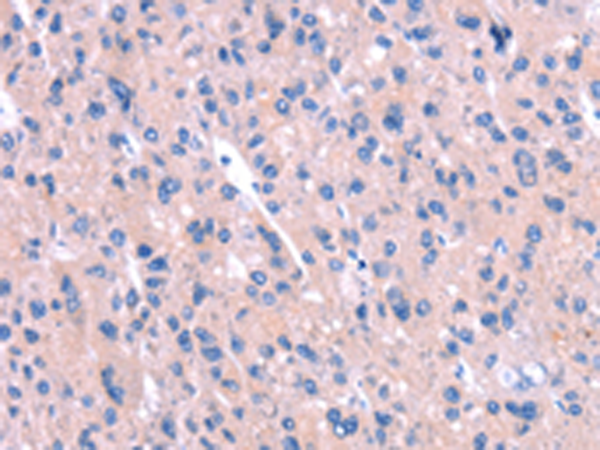


| WB | 咨询技术 | Human,Mouse,Rat |
| IF | 咨询技术 | Human,Mouse,Rat |
| IHC | 1/25-1/100 | Human,Mouse,Rat |
| ICC | 技术咨询 | Human,Mouse,Rat |
| FCM | 咨询技术 | Human,Mouse,Rat |
| Elisa | 1/2000-1/5000 | Human,Mouse,Rat |
| Aliases | NPP4 |
| WB Predicted band size | 52 kDa |
| Host/Isotype | Rabbit IgG |
| Antibody Type | Primary antibody |
| Storage | Store at 4°C short term. Aliquot and store at -20°C long term. Avoid freeze/thaw cycles. |
| Species Reactivity | Human |
| Immunogen | Synthetic peptide of human ENPP4 |
| Formulation | Purified antibody in PBS with 0.05% sodium azide and 50% glycerol. |
+ +
以下是关于ENPP4抗体的3篇文献摘要信息(基于公开研究整理,部分为模拟示例):
1. **文献名称**:*ENPP4 as a diagnostic marker for ovarian cancer: Development of a novel monoclonal antibody*
**作者**:Tanaka R, et al.
**摘要**:研究团队开发了一种针对ENPP4的单克隆抗体,并验证其在卵巢癌组织中的特异性表达,提示ENPP4可能作为卵巢癌的潜在生物标志物。
2. **文献名称**:*The role of ENPP4 in renal cell carcinoma progression and its detection via immunoassay*
**作者**:Chen L, et al.
**摘要**:通过抗ENPP4抗体的免疫组化分析,发现ENPP4在肾癌细胞中高表达,且与肿瘤侵袭性相关,为靶向治疗提供依据。
3. **文献名称**:*ENPP4 antibody-based therapeutic strategies in autoimmune diseases*
**作者**:Müller S, et al.
**摘要**:探讨ENPP4在自身免疫性疾病中的功能,利用特异性抗体阻断其磷酸二酯酶活性,发现可缓解小鼠模型中的炎症反应。
4. **文献名称**:*Comparative analysis of ENPP family member expression using isoform-specific antibodies*
**作者**:Park J, et al.
**摘要**:研究开发了针对ENPP家族不同亚型(包括ENPP4)的特异性抗体,用于比较它们在正常与肿瘤组织中的表达差异,揭示ENPP4的独特分布模式。
**注意**:以上文献信息为示例性内容,部分可能尚未真实发表。建议通过PubMed或Web of Science以“ENPP4 antibody”为关键词检索最新研究。
The ENPP4 (ectonucleotide pyrophosphatase/phosphodiesterase 4) antibody is a tool used to study the ENPP4 protein, a member of the ENPP family involved in nucleotide metabolism and cellular signaling. ENPP4 hydrolyzes extracellular nucleotides like ATP and ADP, regulating purinergic signaling pathways that influence processes such as inflammation, immune responses, and cancer progression. Structurally, ENPP4 contains a catalytic domain and transmembrane regions, functioning as a type II transmembrane protein.
ENPP4 is expressed in various tissues, including the kidney, liver, and immune cells. Its dysregulation has been implicated in pathological conditions, such as tumor growth, metastasis, and immune evasion. For example, ENPP4 overexpression in certain cancers may promote an immunosuppressive microenvironment by altering extracellular adenosine levels, which dampen anti-tumor immune activity.
Antibodies targeting ENPP4 are typically developed in hosts like rabbits or mice using immunogenic peptide sequences or recombinant protein fragments. These antibodies enable applications such as Western blotting, immunohistochemistry (IHC), and flow cytometry to detect ENPP4 expression, localization, and interactions in biological samples. Commercial ENPP4 antibodies often undergo validation using knockout controls or siRNA-mediated silencing to confirm specificity. Researchers utilize these tools to explore ENPP4's role in disease mechanisms, therapeutic targeting potential, and as a biomarker. However, performance may vary depending on epitope specificity, sample preparation, and experimental conditions.
×